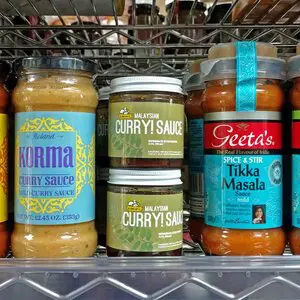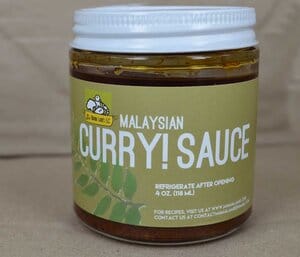
Lost in Translation: Curry Sauce to Curry Paste
The Chinese To English Translation
In the English language, when we hear the word “paste”, we know it is a more concentrated form. In the Chinese language, there is no word for “paste”. “Curry paste” and “curry sauce” are both translated to 咖喱酱 (gai li jiang).
Language is quite fascinating. It’s great growing up in a household that had English and Chinese flowing through, but when you had to explain a Chinese phrase or word in English to a friend or vice versa, it was not always easy. Sometimes there is no direct translation, but just the best translation you can come up. To truly understand it, you’d have to hear the phrase or word used a few times in different scenarios and then you’ll fully understand the meaning of it.
In our instance, 酱 (jiang) is translated quite simply to “sauce” and 咖喱 (gai li) translates to curry. So naturally, we called our first product “Mama Lam’s Curry Sauce”. It never crossed our minds that the product is more of a paste than a sauce!

Mama Lam’s initial curry sauce

Mama Lam’s initial curry sauce
The Problem We Encountered
Super stoked and excited, we went to market with our curry sauce! We pitched to stores and got some initial orders. Then, that’s when it hit us. Our small 4 oz jars are being placed next to larger 12 oz jars of actual curry sauces! A few thoughts that came to mind:
How would anyone know that Mama Lam’s is a concentrated form?! That the whole jar would get you 7-8 meals, while the 12 oz curry sauce would be half of that?
People would look at the shelf and think they are getting a better bang for their buck with the 12 oz jar!
Our jars are getting lost next to the larger jars…
The Chinese To English Translation
In the English language, when we hear the word “paste”, we know it is a more concentrated form. In the Chinese language, there is no word for “paste”. “Curry paste” and “curry sauce” are both translated to 咖喱酱 (gai li jiang).
Language is quite fascinating. It’s great growing up in a household that had English and Chinese flowing through, but when you had to explain a Chinese phrase or word in English to a friend or vice versa, it was not always easy. Sometimes there is no direct translation, but just the best translation you can come up. To truly understand it, you’d have to hear the phrase or word used a few times in different scenarios and then you’ll fully understand the meaning of it.
In our instance, 酱 (jiang) is translated quite simply to “sauce” and 咖喱 (gai li) translates to curry. So naturally, we called our first product “Mama Lam’s Curry Sauce”. It never crossed our minds that the product is more of a paste than a sauce!

Mama Lam’s initial curry sauce
